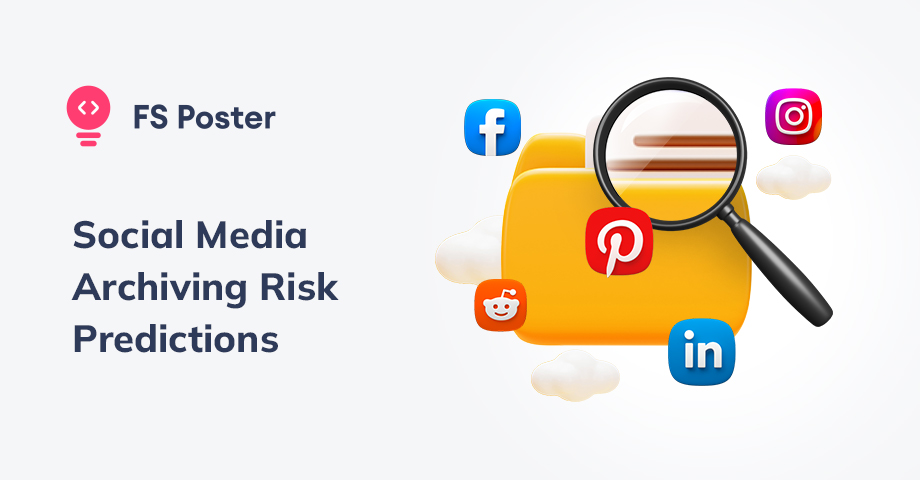
Mina Klein
Author
Many businesses use social media regularly to post images and updates and interact with and engage their followers, trying to improve their bottom line and boost brand awareness. And, since 78% of customers are ready to buy from a company after a good experience on social media, the benefits of social media for businesses are undeniable. But, with the company’s easy access to its target audience granted by choice of the right platform comes an increased threat to its security.
This article will discuss the risks companies will likely face in 2025 and how social archiving can make all the difference.
Social Media Disinformation
Fake news has plagued social media and the web in general. Distinguishing facts and fiction has become almost impossible nowadays, and it’s very unlikely that things will take a turn for the better in the year to come.
Unfortunately, many seem to believe disinformation strongly. We’ve all witnessed how misinformation and fake news have been spread during the Coronavirus outbreak, causing harm to vaccination efforts and harming many lives.
Considering how practically anyone can easily manipulate social media information using modern technology, businesses must safeguard their social media archives. To verify what they said, they must be able to provide immutable archives of their original posts and comments in the actual context. This way, social archiving guarantees the authenticity of data, meaning such archives will hold up in court.
Work-from-Home Risks
In 2025, when employees are more likely than ever to work remotely and use different Software as-a-service apps in their everyday workflow, a new set of challenges awaits.
Various chat and videoconference apps, project management, customer support tools, etc., will continue to gain on their significance. In such an environment, the odds are high that employees don’t know each other well and are at risk of falling for impersonation scams and attackers tricking them into disclosing passwords or additional sensitive data. You can consider employee survey tools to generate ideas, gather employee feedback, and have better management and regulations. Companies should also keep in mind the expanding opportunities for workplace harassment using electronic devices, which they can be held liable for.
As a screenshot of a Zoom meeting or a Slack chat wouldn’t hold in court and is not a reliable method of social media archiving, companies will have to find more reliable solutions to capture the information and its entire context.

The public will hold businesses accountable
In the year to come, the public eye will continue to monitor businesses’ views and actions and hold them accountable for potentially harming individuals, communities, and the environment. For example, many companies worldwide are being held accountable for greenwashing - using a deceitful way of advertising to appear more sustainable than they are.
Businesses should always be prepared to support their marketing and advertising statements with facts. Social media archiving will be essential for a company’s protection against such allegations as they will be able to prove they are not making false or misleading claims.
Violation of Compliance
No matter how much effort businesses put into prevention on social media, they risk violating relevant laws and regulations, potentially resulting in expensive and exhaustive lawsuits.
Violations of privacy rights, trademarks and copyrights, employment issues, and data security are real threats to companies on social media. These issues may also pose a danger because of the company’s retention policies or e-discovery needs.
A social media archiving tool that can capture private messages and metadata (a form of digital signature) and deliver advanced search results of the captured content would allow businesses to respond better to this type of incident and produce social media evidence for e-discovery.
Defamation, Libel, and Slender
Offensive language, trolling, cyberbullying, libel, and slander are other dark sides of social media platforms that will continue to cause harm to individuals and businesses in 2025. Defamation is defined as communicating false statements to a third party that can seriously harm individuals’ and companies’ reputations. Defamation can take two forms:
- Slender - spoken defamation
- Libel - written defamation.
Everyone can fall victim to defamation. Some well-known examples of libel lawsuits over their tweets include Donald Trump, Elon Musk, James Woods, and Courtney Love.
The wrongdoers, varying from individuals ( “keyboard warriors” and trolls) to organized groups, can try to defame your business for reasons unknown by posting content that can damage your company’s reputation. They can exaggerate the truth, fail to provide the whole story, or post completely false information. Others may unwittingly participate in your business’s defamation by “sharing” their posts, sometimes on other social media platforms.
As defamation can lower your audiences’ opinion of your business, a social media policy on content moderation and controlled user access will be essential to keep these matters under control.
However, if your business is being targeted on social media, you need to capture a defaming statement quickly to collect evidence of slander. There’s always a risk that the author will delete or edit the post. A social media archiving tool will allow you to keep proof authenticated and defensible. This way, you will also be able to use it in court if things become unmanageable.
Hijacking Brand Name and Products
On social media, there is always the risk of third-party fraud. Fraud usually includes exploiting the company’s name and brand to gain access to its target audience without its knowledge or counterfeiting the counterfeiting of its products.
Some businesses use social listening tools to track all mentions of their brand or products on social media and internet sites. They do so to improve their customer support and service, but it works great for spotting the hijackers on time.
Conclusion
We hope that after this brief insight into all the dangers of social media, you’re not a step away from closing your company’s Instagram or Twitter account permanently. But the choice is yours, and there are only so many options to choose from. You can either face these dangers unprepared or have a solid social media policy and a strong social media archiving tool to minimize the risks and protect your business.
Alternatively, you can try to learn how to run your business successfully without using social media.









